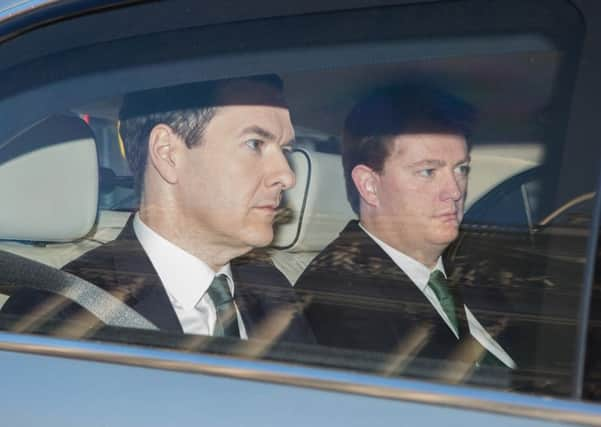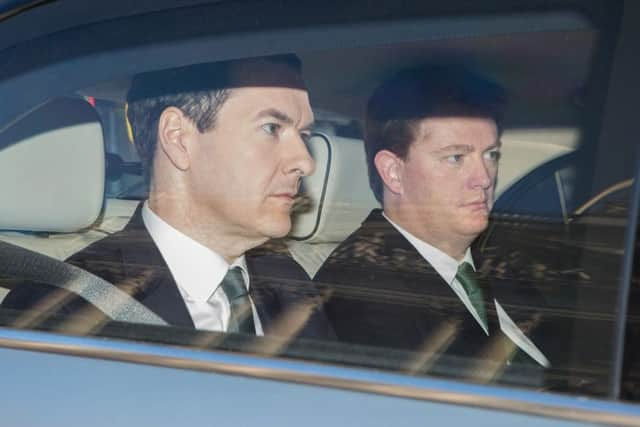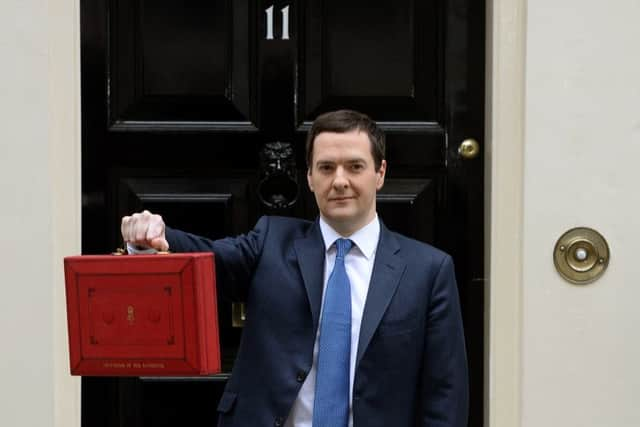Gloves come off as Osborne offers olive branch to home buyers


Delivering a nakedly political pre-election Autumn Statement, the Chancellor branded the existing levy a “tax on aspiration” and said he would scrap the ‘cliff edges’ which distort the property market.
The surprise shake-up emerged after Mr Osborne was forced to admit that weak tax revenues mean the deficit is not falling as fast as hoped and will be over £90 billion this year.


Advertisement
Hide AdAdvertisement
Hide AdHe pointed to forecasts of surging 3% growth and appealed for voters to let him “finish the job” of overhauling the economy.
Labour seized on the missed deficit targets.
But the attack was blunted by the surprise final flourish of Mr Osborne’s package, which effectively ditched the long-standing stamp duty structure.
The Chancellor declared that the ‘slab’ system - which sees buyers charged a percentage of the full purchase price as soon as the value hits thresholds - was being abandoned.


Instead, from midnight tonight different percentage rates will be charged to each portion of the price.
Advertisement
Hide AdAdvertisement
Hide AdMr Osborne said the reform represented a tax cut of £800 million per year.
Only homes that cost over £937,000 will see their bill go up. A £5 million pound house will see its stamp duty rise from £350,000 to £514,000.
Outlining the shift, which will be seen as an effort to outflank Labour’s policy of introducing a ‘mansion tax’, Mr Osborne told the Commons: “There has been a debate in this country about taxing houses.
“The system I introduce today replaces a badly designed system that has distorted our housing market for decades.
Advertisement
Hide AdAdvertisement
Hide Ad“It reduces the stamp taxes for 98% of people who pay them in this country. It increases the taxes on the most expensive 2% of homes, but only asks people to pay that tax when they buy the house and they have the money.
“And it does not involve a revaluation of hundreds of thousands of homes in this country.”
The Chancellor said Office for Budget Responsibility (OBR) forecasts showed Britain would be the fastest growing advanced economy in the world this year and hundreds of thousands of jobs were being generated.
But growth is expected to slip back below 2.5% in subsequent years. And he confirmed that borrowing was estimated be £91.3 billion this year - rather than the £86.4 billion previously expected.
“Now Britain faces a choice,” Mr Osborne told MPs.
Advertisement
Hide AdAdvertisement
Hide Ad“Do we squander the economic security we have gained, go back to the disastrous decisions on spending and borrowing and welfare that got us into this mess?
“Or do we finish the job - and go on building the secure economy that works for everyone.
“I say: we stay the course. We stay on course to prosperity.”
The Chancellor insisted the UK’s budget deficit had been halved since 2010 and was still forecast to fall in every year. By 2018-19 the government is due to record a surplus of £4 billion.
Advertisement
Hide AdAdvertisement
Hide AdThe OBR also anticipates above inflation wage rises for the next four years.
Mr Osborne said the fiscal position was helped because the welfare bill and debt interest repayments had been reduced, meaning extra cash could be diverted to the NHS.
But he conceded that “substantial savings” in public spending will still be required in the next parliament.
Among the other measures unveiled by the Chancellor were:
• Inheritance tax exemptions for aid workers who go to help with the Ebola crisis;
Advertisement
Hide AdAdvertisement
Hide Ad• Crackdown on tax avoidance including a 25% levy on firms that divert profits overseas;
• Non-dom charges to be increased for people who have been in the UK more than 12 years;
• £1.2 billion revenue from bank Foreign Exchange trading fines to go to GP practices;
• Air Passenger Duty to be abolished for under-12s;
Mr Osborne said business rates would be reviewed, with bigger discounts to help high street shops under pressure from internet competitors. He also ruled out rises in fuel duty.
Advertisement
Hide AdAdvertisement
Hide AdOn personal taxation, he said the higher rate threshold would go up in line with inflation to just under £42,385.
Declaring that the case for ‘English Votes for English Laws’ was “unanswerable”, he signalled that powers over corporation tax would be devolved to Northern Ireland.
However, shadow chancellor Ed Balls said Mr Osborne had questions to answer about living standards, wages and tax receipts, adding: “There is a cost of living crisis.”
And taunting the Chancellor’s missed target on the deficit, Mr Balls told MPs: “He is going to carry on missing his deficit targets for year after year.”
Among the other measures unveiled by the Chancellor were:
Advertisement
Hide AdAdvertisement
Hide Ad• Inheritance tax exemptions for aid workers who go to help with the Ebola crisis.
• Crackdown on tax avoidance including a 25% levy on firms that shift profits overseas.
• £1.2 billion revenue from bank foreign exchange trading fines to go to GP practices.
• Limit on saving in New ISAs to rise to £15,240 and ISAs to be inherited tax free.
Advertisement
Hide AdAdvertisement
Hide Ad• Hospice charities, search and rescue and air ambulance to be granted VAT refunds.
• Inheritance tax exemption extended to cover aid workers who die dealing with humanitarian emergencies.
• End of military operations in Afghanistan to save an additional £200 million this year.
• New 25% diverted profits tax on multi-national profits generated in the UK and “artificially” moved out of the country.
• Fuel duty is kept frozen.
Advertisement
Hide AdAdvertisement
Hide Ad• Higher rate income tax threshold to rise to £42,385 next year.
• Income tax free personal allowance to rise to £10,600 rather than the planned £10,500 next year, giving wage boost of £825 a year.
• National Insurance on young apprentices to be abolished.
• People who die under 75 to be enabled to pass on annuities tax free.
• Tendering for new franchises for Northern Rail and Trans-Pennine Express to replace pacer carriages with modern trains.
Advertisement
Hide AdAdvertisement
Hide Ad• Government-backed loans of up to £10,000 made available for all students undertaking post-graduate masters degrees.
• Air passenger duty for children under 12 abolished in May 2015 and for under 16s in 2016.
• Clampdown on aggressive tax avoidance to raise £2.8 billion.
• New sovereign wealth fund to invest proceeds from shale gas resources in the North in the north of England.
Advertisement
Hide AdAdvertisement
Hide Ad• Annual charge on properties “enveloped” to avoid stamp duty to rise by 50% above inflation on properties over £2 million.
• National debt incurred during First World War to be repaid.